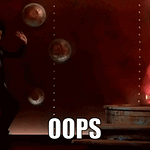Hi everyone—I’m so glad to have you here. What a week.
This newsletter is all about unpacking terms, concepts and events in the world of economics & Bitcoin so that ordinary people just trying to get by can be at less of a disadvantage when it comes to making financial decisions.
What does this mean, in plain English? Why didn’t I know about this? If it’s so good why doesn’t everyone get it? If it’s so bad why isn’t everyone freaking out? What the hell can I do about it?
That sort of thing.
It’s called Surf Report because you can’t control the waves but you can learn to ride them, and it helps when you know as much as you can about the weather, the water, the shoreline, and the seafloor.
If I had to sum up my personal finance strategy and approach to saving, spending, and investing it would go something like this:
Your primary mission is to not lose what you already have. Every purchase of a depreciating asset goes against this mission, and every dollar put into an appreciating asset—or nothing at all—helps this mission. Your primary mission is to avoid loss and ruin.
To avoid ruin, you’re gonna need an “oh $*!#” fund set aside for unexpected disasters or inconveniences. Some healthy buffer to account for accidents, repairs, or bailing a friend out of jail. This should be cash or cash equivalents for use within the year, so don’t stress about the inflation rate. (Savings accounts and CDs used to be great for this and could help you avoid the inflation tax, but those are a things of the past now.)
Once you’ve got a healthy “oh $*!#” fund you can start setting aside capital for future you. Money needed between 1-4 years can be put in more liquid (i.e. more easily accessible/redeemable) assets you’re more comfortable holding, while money not needed for 5-10+ years should be put into assets where growth has a long enough time horizon for the magic of compounding to do its thing. I’m essentially describing the spectrum between saving and investing. Placing your excess funds along this spectrum (after you’re buffered for disaster) is like planting saplings vs. planting seeds so that future you has a forest but near term you has some lumber to build with.
I’m getting to a point here: my entire strategy is premised on the notion that there will be a future me who will need and want to use what I’m putting away, and that the future is a thing worth wanting and working toward. But interest rates right now are negative, meaning our purchasing power is melting away at a reported rate of 7.9% per year while long-term treasury bonds will only earn us 0.25-0.50% per year. Your cash will buy you half as much in a decade.
What will become of a generation when they realize they are priced out of having a future at all?
What does it say about a culture that discourages saving and encourages desperation spending just to avoid further loss?
And what happens when the rest of the world continues to stop financing this Ponzi, forcing our own government to keep buying their own debt using their own freshly printed money, like a chef paying for all the diners’ meals and calling the restaurant a success?
“We’re selling our seeds for next year’s harvest today in order to get that GDP boost and absolutely demolishing our savings. We’re parting out our farming equipment and selling our barn just so that we can pump up the numbers, and we’re just not going to have a harvest next year. And this goes on as long as other countries are willing to finance it—and that has stopped.”
—Guy Swann
After the U.S. demonstrated to the world last week that Treasuries held in other countries can be deemed worthless at will if the U.S. government doesn’t approve of the way a country is behaving, it does not bode well for future global demand for Treasuries.
Treasuries represent U.S. debt. For context of just how bad this is: the U.S. has a $660 billion deficit, 8x the second biggest deficit on the planet which is the U.K., coming in at $73 billion. (These are 2020 figures, the most recent for which we have data.)
“We’re pretending this doesn’t matter. And all of the conditions that have allowed it to not matter are falling away. All of the important pieces of the puzzle that have made sure that this hasn’t come back to bite us in the ass for about 30 years have basically been systematically dismantled since 2008. And a couple of really important pieces of the Jenga tower have just come out in the last month.”
—Guy Swann
Remember: the bond (a.k.a. debt, a.k.a. fixed income) market is the dog that wags the tail of equities, not the other way around.
Serious investors and analysts pay extremely close attention to the bond market rather than the stock market because the bond market is where you find the cost of capital, a.k.a. interest rates. Interest rates are the hurdle that entrepreneurs and investors need to beat in order for their efforts to make financial sense, but also the price they pay for borrowing money to fund their efforts. It’s a little complicated when you get into the weeds, but also basically that simple.
Anyhoo, if this past Friday were the end of the month, March would be the worst total return month in over 42 years for the bond market:


This might seem hyperbolic to some people. If this problem was able to gradually build and get worse over the course of 30 years can’t the Fed or whoever just spend the next 30 years gradually fixing it?
The ability for a fiat Ponzi economy to unwind devastatingly quickly despite a slow, gradual accumulation of systemic effects has to do with notions of criticality and math, but I prefer to stick with the “unwind” metaphor and think of it in terms of thread: it’s much easier to pull a thread through the eye of the needle than to push it.
Market participants are happy being patient for long periods of time as long as things are generally okay and problems are small or hidden, but prefer to sell quickly before things get terrible and will do so the instant it becomes clear to them that the Fed has no way out. You can afford to spend the time necessary to thread needles if you’re in the process of making clothes, but can yank it out as soon as you realize the building’s on fire.
Markets unwind (i.e. sell off) fast. And the speed is accelerated by the cascade of forced liquidations and margin calls that occur on the way down, tripping the breakers of derivatives markets as margin traders who might be inclined to hold are told by their lender to sell.
This all might sound bleak, but I’ve never been more optimistic about what lies on the other side of the storm.
This past week, Bitcoin continued it emergence on the global stage as an accepted way to opt out of the whole U.S. Fed Ponzi game entirely. In a press conference on Thursday, the chairman of Russia’s Congressional energy committee, Pavel Zavalny, said the country is open to accepting bitcoin and gold for its natural resources exports.
And just yesterday, CNBC published this absolute unit of a news story: “Exxon is mining bitcoin in North Dakota as part of its plan to slash emissions”
The dominoes are falling. The big dogs are starting to get it.
The Exxon news will be great for the company’s balance sheet, but is a particularly big win for the long-term viability and health of our air quality and environment. The methane vents Exxon is now capping and using to power generators don't need to be located near homes and businesses—or any population center at all—for them to be monetized. There are flares in remote, stranded areas that were previously worthless but can now generate revenue and subsidize energy prices. Now Exxon can use, or sell, these previously untapped energy sources for mining Bitcoin while reducing greenhouse gas emissions in the process.
Look at how beautifully the incentives are aligned here: it's finally in Exxon’s own self-serving best interest to reduce greenhouse gas emissions. They are improving air quality and reducing waste because it’s good for business.
Again, this newsletter is about helping ordinary people, not dictators or Fortune 500 corporations. So what’s an ordinary investor to do? The same thing the big dogs are doing: start leaving the game entirely.
“On a medium-term basis, it is time to back up the John Deere excavator and scoop up as much gold and Bitcoin as you can afford. This is it, the start of a monetary regime change. Nothing lasts forever, and the days of Petro / Eurodollar supremacy are over. The phase shift will be chaotic, it will be volatile, it will morph, but it will 100% be MASSIVELY inflationary in fiat currency terms.
There is no government, ever, that resisted the temptation to print money in order to pay its bills and placate its citizens. The government will never voluntarily go bankrupt. This is axiomatic. I challenge you to contradict me with evidence.”
—Arthur Hayes, from his recent essay Energy Cancelled
The Fed and the government will keep finding clever ways to kick the can as long as they can, and it’s anyone’s guess when they run out of ideas or push their luck too far. 3 months? 6 months? A year? 2 years? Who’s to say.
Take this time to start exploring the distinction between Being A Prepper™️ and sensibly preparing for the future. There is a difference, and it lies in the space between overreaction and appropriate reaction. Saving in assets, holding property, building relationships with local food producers, filling your pantry… these are things that are always good ideas, not just when times look rough but even when times are great.
Saving & investing, in many ways including the most important ones, is all about preparing for the future. That’s it. And the less sure you are about how things will turn out—the less trust you have in your place in the future—the more importance you should place in what you know you will need regardless.
When the unwind happens, be the one watching and not the one unraveling.
Until next time 🤙,
Recommended Resources For Plan ₿
Swan. I became an official Swan partner because I love them so much. So if you're like me and just want an easy, automated way to buy bitcoin on the regular with the lowest fees in the game, head to https://swanbitcoin.com/Mulvey to get $10 in bitcoin for free ✨
Fold Card. Earn bitcoin on everything. You can win up to 100% back on every purchase, and every swipe is a chance to win a whole bitcoin. I use my own Fold card to pay for almost literally everything. If you use this referral link you get 5,000 sats free ✨














